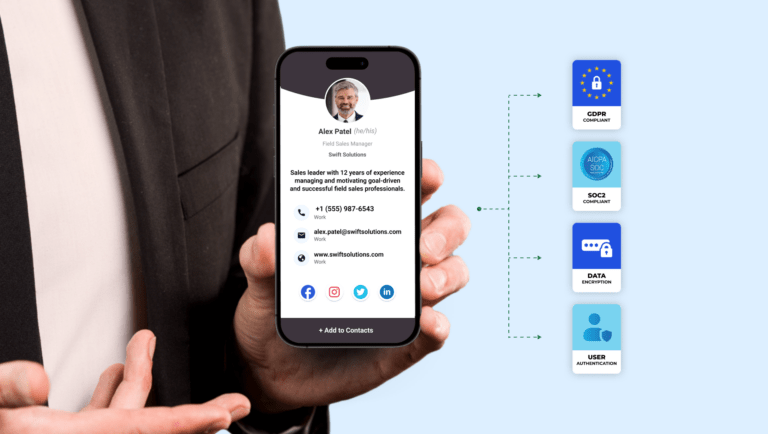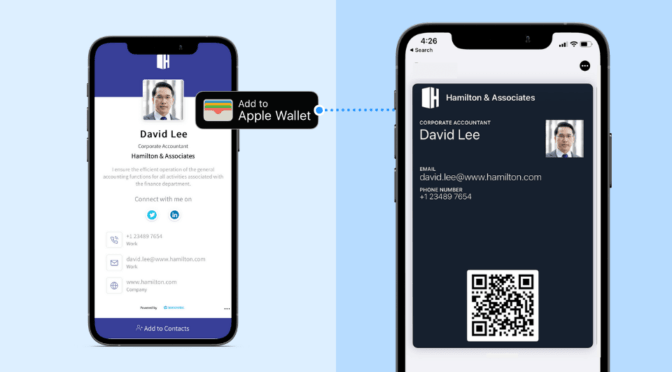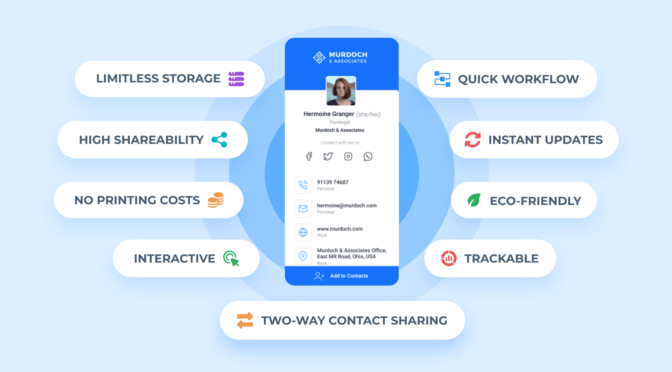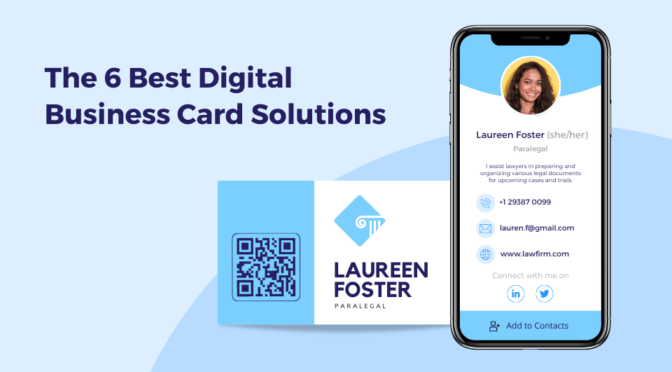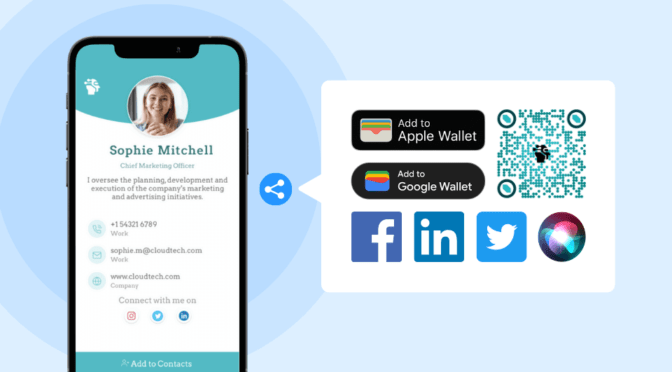Cyber threats are just a click away; even sharing your contact information can open doors to data leaks, phishing attacks, or identity theft. In an era where digital presence is critical, one common question arises: Are digital business cards safe?
From QR Code scams that redirect you to malicious sites to social engineering attacks fueled by scraped LinkedIn data, digital communication isn’t always as safe as it seems. So, as paper business cards fade into the background, it’s fair to ask: How secure are digital business cards?
The good news? With the right security features, digital business cards don’t just match paper; they outperform it. Let’s explore the real-world threats digital business cards prevent by addressing privacy concerns and protecting your data.
Table of contents
- Are digital business cards safe?
- 7 ways a digital business card shields you from security threats
- How can Uniqode help mitigate cybersecurity risks?
- What can digital business card holders do to stay secure?
- Create safe and secure digital business cards with Uniqode
- Frequently asked questions
Are digital business cards safe?
Digital business cards (or virtual business cards) facilitate the exchange of confidential and sensitive information. For this reason, top digital business card solutions implement various security measures to protect user data from all levels.
These measures include data encryption and central management, making digital business cards safe and secure.
However, it’s important to note that only the best digital business card solutions offer security measures for enterprise businesses. Your solution of choice is still critical in maximizing the security of your networking initiatives.
Let’s understand the threats digital business cards can safeguard us from.
7 ways a digital business card shields you from security threats
You can typically share digital business cards in two simple ways: a clickable URL or a scannable QR Code. Both methods are fast, convenient, and, when used right, secure. But in today’s cyber threat landscape, even the safest tools can be exploited.
Think about it: A team member clicks on what looks like an authentic link in an email only to land on a phishing site. It’s more common than you’d think; phishing accounts for nearly 90% of data breaches, according to Cisco’s Cyber Threat Trends Report.
Let’s dive into how they do it.
1. Strong encryption standards
Think of data as the currency of the digital world. You wouldn’t walk around with cash falling out of your pockets; similarly, you shouldn’t leave your data exposed. Yet, that happens when information is left unencrypted, making it easy pickings for cybercriminals.
In 2023, over 2,500 organizations fell victim to the MOVEit data breach. Attackers exploited a vulnerability to intercept unencrypted data during transmission. Even one unprotected digital touchpoint, like a digital contact card, can become the weak link.
Here’s where 256-bit AES encryption at rest and TLS 1.2 encryption for digital business cards step in. When your virtual business card is encrypted, it’s converted into unreadable code, accessible only to authorized users. This protects sensitive information like your contact details, company credentials, and embedded documents from man-in-the-middle (MitM) attacks or server breaches.
A secure digital business card implements strong encryption both in storage and transit, ensuring full data protection.
So, is your information safe on digital business cards? With proper encryption, yes.
2. Robust access controls
Not all threats come from the outside—sometimes, it’s a former employee with lingering access or someone internal with more permissions than necessary. Here’s where digital business card security gets tested.
Digital business cards have strong access features like Single Sign-On (SSO) and Multi-Factor Authentication (MFA).
SSO lets users log in through trusted platforms such as Google or Microsoft, reducing weak passwords and giving IT teams complete control to, if required, instantly revoke access. Multi-factor authentication (MFA) adds an extra layer by requiring a second verification step, like a one-time code, so even if a password is compromised, unauthorized access is blocked.
Enterprises can prevent the flow of information within the organization by leveraging role-based access control. This means users only access what they need, minimizing human error and misuse. These measures elevate digital business card security and significantly reduce privacy concerns with digital business cards.
3. Enterprise management features
Decentralized access = disorganized risk.
Without centralized control, cards can be duplicated, outdated, or worse, never revoked, leaving gaps in business card security.
IBM’s 2023 report found that organizations with strong access governance saved an average of $1.76 million per breach. Centralized management pays off.
With centralized management for digital business cards, admins can instantly assign roles, revoke access, and monitor who’s doing what. This is perfect for remote teams, high-turnover environments, or regulated industries.


4. Card-level protection
In 2022, confidential military documents in the US were accidentally leaked through a publicly shared Google Drive link. The problem wasn’t the file itself; the breach was caused by unrestricted access.
A secure digital business card addresses this with card-specific security settings, such as password protection and expiration dates. These settings ensure that only the right people can access your card and only for as long as you permit.
This granular level of control, down to the individual card, means that even if one link is compromised, the damage is contained. It’s proactive security baked into how digital business cards operate.
5. Phishing detection systems
Phishing isn’t just in your inbox anymore. A malicious actor can clone a digital card or spoof a link, tricking someone into sharing sensitive information.
In 2023, phishing caused 36% of all data breaches. Many of these attacks started with just one sketchy link.
With anomaly detection and phishing URL scanning, secure digital business card platforms can flag suspicious activity and neutralize digital business card security risks.
💪Strengthen your brand’s security with White Labeling
White labeling lets you replace generic URLs with your own domain, so when someone views your digital business card, the link at the top shows your company name, not a third-party brand. It’s a simple way to build trust and look more professional.

- Customize and brand your digital business cards while integrating security features like phishing detection and data protection.
- Protect your business and build trust by offering clients a secure, professional, branded experience.
6. Compliance and certification
Compliance isn’t optional anymore.
From GDPR in Europe to HIPAA in the U.S., regulations now dictate how customer data must be handled, and violating them can be costly.
For industries like healthcare, HIPAA compliance protects sensitive patient information. For financial services, SOC® 2 compliance ensures that your data is handled with the utmost security, safeguarding private financial data. ISO 27001 is crucial across industries, showing that your organization adheres to the best practices in information security.
These certifications prove that your digital business card solution has been audited globally for the highest security and privacy benchmarks.
Uniqode ensures digital business card security by meeting these standards and offering secure two-way contact sharing. This feature allows both parties to exchange contact information while ensuring that sensitive data is securely transmitted, minimizing the risk of exposure and maintaining compliance with stringent privacy regulations.
7. Security testing and anomaly detection
Even the best setups need regular checkups.
Hackers often exploit unpatched systems or unusual access patterns that go unnoticed until it’s too late.
A 2022 Microsoft Exchange zero-day exploit allowed attackers to siphon emails undetected because no one caught the unusual activity early enough.
Digital business card platforms that conduct regular penetration testing and analytics monitoring help detect vulnerabilities and unusual behavior, such as bots scraping card links or sudden traffic spikes.
How can Uniqode help mitigate cybersecurity risks?
Uniqode packs a solid set of security features to ensure your digital business card and your data is secure. Here’s how it addresses every major risk:
| Cybersecurity risk | Uniqode’s security feature | Benefits |
| Data breach | 256-bit AES encryption at rest and TLS 1.2 encryption in transit. | Protects sensitive data from unauthorized access during storage and transmission. |
| Unauthorized access | Single Sign-On (SSO) with SAML 2.0 and Multi-Factor Authentication (MFA). | Ensures only authorized users can access digital business cards. |
| Phishing attacks | Phishing URL detection and blacklisting. | Prevents users from accessing malicious links associated with digital cards. |
| Insider threats | Centralized management with role-based access controls. | Allows administrators to control and monitor user permissions effectively. |
| Data integrity issues | Anomalous scan detection mechanisms. | Maintains accurate engagement metrics by filtering out abnormal activities. |
| Regulatory non-compliance | Compliance with GDPR, HIPAA, SOC 2® Type 1 Type 1 and 2, ISO 27001:2022. | Ensures adherence to global data protection standards. |
| Outdated or misused cards | Ability to revoke or suspend digital cards centrally. | Prevents misuse of cards by former employees or unauthorized individuals. |
Uniqode’s platform goes above and beyond to answer “Are digital business cards safe?” with a certain “yes”.
Now, let’s explore how digital business card holders can further safeguard their data and reduce risks in everyday use.
What can digital business card holders do to stay secure?
Picking a secure virtual business card platform is a great start, but you can do more to keep your data safe. Here are a few simple tips to stay ahead of the risks.
1. Always preview and verify QR Code links
QR codes can be manipulated to redirect users to malicious websites, which can lead to potential data theft or malware infections.
How to go about it?
- Use preview features: Utilize QR Code scanners that display the URL before opening it, allowing you to verify the destination.
- Opt for branded URLs: Use branded URLs, which are easier to recognize and less susceptible to spoofing.
Note: Create your secure QR Codes with Uniqode and stay safe effortlessly.
2. Use password protection when required
Not all digital business cards are meant for public viewing. Sensitive information shared with specific individuals requires additional security layers.
How to go about it?
- Implement passwords: Protect cards containing confidential information with strong, unique passwords.
- Set expiry dates: Use platforms that allow you to set expiration dates for access, ensuring temporary sharing doesn’t become permanent exposure
3. Limit public sharing
Sharing your digital business card indiscriminately increases the risk of it falling into the wrong hands, potentially leading to phishing attacks or unauthorized data collection.
How to go about it?
- Controlled distribution: Share your card through secure channels like email, internal messaging platforms, or CRM systems.
- Use dynamic cards: Opt for digital business cards that can be updated or deactivated as needed, providing flexibility and control over your shared information.
4. Regularly revoke or archive outdated cards
Inactive or forgotten digital business cards can become vulnerabilities if they contain outdated or sensitive information.
How to go about it?
- Conduct regular audits: Review your digital business card inventory quarterly to identify and manage outdated cards.
- Archive or delete: Remove cards that are no longer used to prevent potential misuse.
Enhance security with Microsoft Entra ID integration
Microsoft Azure ID integration allows you to automate the onboarding and offboarding of employees for digital business cards, ensuring seamless and secure team management.

- Automates user access management for enhanced security.
- Eliminates manual audits and deletions, reducing the risk of human error.
- Ensures only authorized users have access to sensitive data.
- Simplifies access control, allowing admins to maintain tighter security.
- Supports compliance with security protocols by automating processes.
5. Educate your team
Even a secure digital business card can be compromised by human error. Ensuring your team knows best practices is crucial for maintaining overall security.
How to go about it?
- Regular training: Conduct cybersecurity awareness sessions covering topics like phishing recognition, secure sharing practices, and the importance of password protection.
- Assign oversight roles: Designate administrators to monitor digital business card usage and ensure compliance with security protocols.
Create safe and secure digital business cards with Uniqode
Uniqode is the only solution that implements all the security measures you have learned. Working in unison, these measures ensure your company’s complete protection against cyber threats and data compromise during networking.
In addition to industry-leading security, Uniqode provides all the functionalities you need to create, manage, and share digital business cards at scale.
- Share your digital business card via Apple Wallet (or Google Wallet)
- Use Two-Way Contact Sharing to capture leads from your digital business card
- Track and analyze your digital business card’s engagement metrics
You can access all of these functionalities without downloading an additional app.

Frequently asked questions
1. Does Uniqode encrypt personally identifiable information (PII)?
Yes. Uniqode uses powerful encryption algorithms to ensure that any personally identifiable data remains private. These algorithms prevent unauthorized users from accessing your organization and end-user data and keep your networking activities safe and secure.
2. Why do organizations trust Uniqode’s digital business card solution regarding data privacy and security?
Uniqode constantly strives to uphold the industry’s highest privacy and security standards. And as a result, thousands of leading global businesses trust our platform to meet their advanced security requirements.
Uniqode employs various security solutions to satisfy these requirements, going above and beyond with SOC® 2 Type 2 compliance and rigorous security audits. This practice ensures user data, at all levels, stays private and is safeguarded from exploitation, misuse, or loss.
3. What are the safety features of a digital business card?
Digital business cards employ several security measures to protect user data:
- Encryption: Data is encrypted both in transit (using protocols like TLS) and at rest (using standards like AES-256), ensuring information remains secure during transmission and storage.
- Compliance standards: Many platforms adhere to regulations such as GDPR, HIPAA, and SOC 2 Type I & II, emphasizing data privacy and security.
- Phishing protection: Advanced systems detect and block malicious links, safeguarding users from phishing attempts.
- Secure servers: Utilization of firewalls and intrusion detection systems helps prevent unauthorized access to stored data.
- Access controls: Robust user access management ensures that only authorized individuals can modify or view sensitive information.
4. Why should I invest in digital business cards?
Digital business cards are cost-effective, eco-friendly, and easy to update in real time. They enhance networking with instant sharing via QR Codes or links, offer engagement through multimedia features, and provide analytics to track interactions, making them smarter and more efficient than traditional cards.
Kritika is a Senior Content Marketer at Uniqode, where she helps readers navigate networking in a phygital world. She has over 4 years of experience in breaking down complex technology trends into actionable insights for the SAAS domain.Her blogs talk about how business can opt for smarter and sustainable networking practices with digital business cards. When she’s not writing, you’ll probably find her baking something new or hanging out with her dog—who, by the way, has her own digital contact card too.







